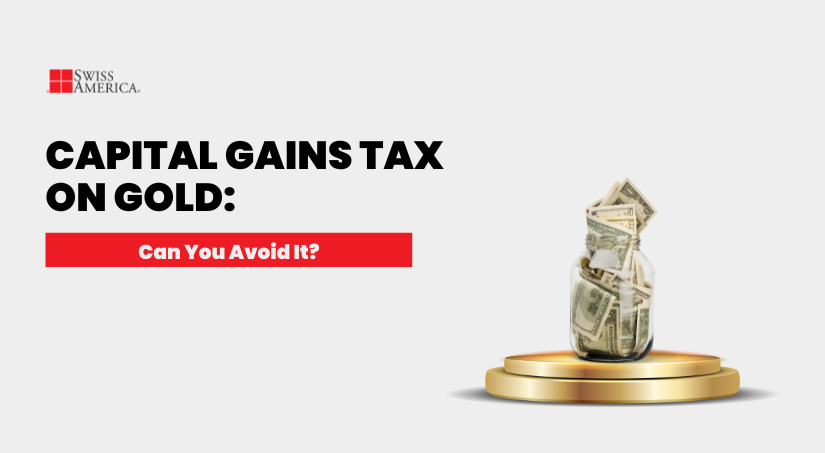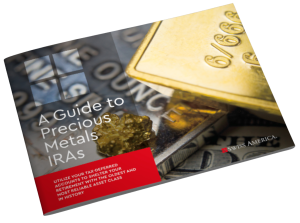
Capital gains tax on gold might not be the five happiest words you’ll see today. Everyone wants to own gold because, among its many other uses and benefits, it can protect your hard-earned dollars. The only downside to all of your gold investment profits is the capital gains tax you’ll have to pay.
While this may sound disheartening, don’t worry. This guide will explain the key points of capital gains tax on gold, how to calculate your tax obligations and strategies to minimize your tax burden.
Once you know the ins and outs of capital gains tax, you can make better decisions about investing in physical gold or holding gold in a retirement account to keep more of your profits.
Understanding capital gains tax on gold
Ever wondered what happens when your golden investment turns a profit? The IRS sees gold as more than a shiny asset—it’s a taxable one.
And while most people associate capital gains tax with stocks or real estate, gold has its own rules. The IRS treats physical gold, such as coins and bars, as a “collectible,” which means the tax rate on your profits could be higher than you might expect.
Stocks, bonds, and exchange-traded funds get taxed at lower rates for long-term capital gains, but physical gold can incur a higher tax rate because of its classification as a collectible.
Since the IRS considers gold and silver collectibles for tax purposes, it automatically applies a maximum capital gains tax rate of 28%.
Short-term vs. long-term capital gains on gold
Timing is everything when it comes to gold—and not just in the market. How long you hold your investment could mean the difference between paying a hefty tax bill or keeping more of your profits.
Short-term capital gains: If you sell an asset like gold coins within one year of purchasing them, any profit is a short-term capital gain. The IRS taxes this type of gain at your ordinary income tax rate, which could be as high as 37% for the upcoming tax year.
Here’s a quick snapshot to help you see how different gold investments are taxed based on how long you hold them:
| Gold in a Traditional IRA | Holding period | Tax rate | How it works |
|---|---|---|---|
| Physical Gold (coins & bars) | ≤ 1 year | Ordinary income tax rate (up to ~37%) | Taxed as short-term gain — higher rate |
| Physical Gold (coins & bars) | > 1 year | Up to 28% (collectibles rate) | IRS treats physical gold as a collectible |
| Gold in Traditional IRA | N/A | Tax-deferred | No capital gains until distribution |
| Gold in Roth IRA | N/A | Tax-free withdrawals (if qualified) | Gain is exempt at distribution |
Calculating capital gains tax on gold sales
Here’s how you can calculate your capital gains tax:
Start by determining your cost basis. This is the total amount you invested in purchasing the gold bullion. This includes the purchase price and any additional expenses like premiums over the spot price, storage fees, and insurance costs.
Once you know your cost basis, you can calculate your capital gain by subtracting this amount from the selling price of your gold.
The IRS taxes the gain at either short-term or long-term capital gains rates, depending on how long you’ve held the gold and your income bracket.
Example calculation
Assumptions
You bought gold coins for $10,000, including all related costs.
You sold these coins for $15,000 after holding them for over a year.
Calculation
Capital gain: $15,000 (sale price) – $10,000 (cost basis) = $5,000
Tax Rate: The gain is long-term since you held the gold for over a year.
Tax Owed: Multiply the capital gain by your applicable tax rate. For example, if your taxable income is above $47,025, you would owe $5,000 * 28% = $1,400 in taxes.
Additional tax considerations
When you file your returns, you’ll report gold and silver sales on Schedule D of Form 1040.
State and local taxes: You may also owe state and local capital gains taxes depending on where you live.
Capital losses: If you sold the gold for less than your cost basis, you’ve incurred a capital loss, which you can use to offset capital gains. You can deduct up to $3,000 of losses against your ordinary income each year.
For scenarios where you have higher losses than this, you can carry them forward to future years.
Minimizing capital gains tax on physical gold investments
Want to hold onto more of your hard-earned gold profits? These strategies could save you thousands come tax time.
Hold for over a year: If you can, hold your gold for at least one year before selling to reduce your tax liabilities.
Invest through gold IRAs: A Gold IRA allows you to hold physical gold within a tax-advantaged retirement account. With this approach, you’ll only pay taxes once you withdraw at retirement age. And, since most people have less income when they retire, it’s likely you’ll be in a lower tax bracket.
Offset capital gains with losses: If you have other investments that have lost value, you could sell them to offset the profits from your gold investments. This strategy basically reduces your overall taxable income.
Maintain detailed records: It’s a good idea to keep records of your purchase, sale, and related costs like storage and insurance.
Even if you pay or get paid for your gold in cash, you still need to note and report it to the IRS.
Special considerations for gold in IRAs
Wondering if you can shelter your gold from taxes? Retirement accounts might just be your golden ticket.
Self-directed IRAs: A self-directed IRA allows you to include physical gold in your retirement portfolio. The IRS has specific rules about the types of gold you can hold in IRAs and rules around the storage of your gold investment.
Tax-deferred growth: Investments in a traditional Gold IRA grow tax-deferred, which means you won’t owe taxes on gains until you withdraw from the account.
Required minimum distributions (RMDs): At age 72, you must start taking RMDs from your retirement accoutns. The IRS calculates the distribution amount based on the value of all assets in the IRA, including your gold.
Myths about taxes on gold
Several myths about the taxation of gold need clarification.
Myth: The IRS always taxes gold as a special asset
Answer: Not true. While the IRS considers it a “collectible,” it’s still a capital asset, with tax rates depending on the holding period.
Myth: You can avoid capital gains tax on gold
Answer: You can’t. While strategies exist to reduce or defer taxes, you can’t entirely avoid paying capital gains tax on profits.
Myth: Only IRS taxes apply to gold investments
Answer: State and local taxes, besides federal taxes on gold investments, may apply.
Myth: Gold sold below a certain amount is not taxable
Answer: Regardless of the amount, you must report all capital gains from gold sales.
Misconception: Capital gains tax on gold only applies when cashing out
Answer: Capital gains tax applies whenever you sell gold for a profit, regardless of whether you receive cash or another form of payment.
Expert help
For IRS-related questions, talking with a tax professional can help verify compliance, help you put a good strategy together, and lower your tax bill.
When you’re ready to add gold to your investment portfolio, here’s why thousands of investors rely on Swiss America:
Over 40 years of experience: Since the early 1980s, we’ve successfully helped investors through various economic shifts and market conditions. Our long-standing history makes us a reliable and seasoned partner in the precious metals industry.
Satisfied clients: We are proud of our loyal client base, who count on us for high-quality metals, attentive customer support, and consistent results that meet or exceed their expectations.
Expert support: Our team provides valuable advice on secure storage, precious metals IRAs, gold-to-silver ratios, portfolio integration, and market trends, helping you make confident investment decisions.
Yes, you’ll have to pay taxes on gold when you sell
To quote Benjamin Franklin, “… in this world, nothing can be said to be certain, except death and taxes.” While you can’t get away from taxes completely, you can take certain steps to maximize the value of your gold investments and keep the lion’s share of your profits. All it takes is a little knowledge and help from a tax professional or precious metals expert.
Contact us today for guidance and expert advice on managing your gold investments.
Capital gains tax on gold: FAQs
Do you have to pay capital gains tax on gold?
Yes, you have to pay capital gains tax on gold when you sell it for a profit. The tax rate depends on how long you’ve held the gold and your income tax bracket.
Is gold free from capital gains tax?
No, gold is not exempt from capital gains taxes. When you sell gold for more than you paid, the profit is subject to capital gains tax.
How much gold can I sell without reporting to the IRS?
There isn’t a specific amount of gold that is exempt from reporting. You must report any gold sale that results in a taxable gain on your income tax return.
Note: The information in this post is for informational purposes only and should not be considered tax or legal advice. Please consult with your own tax professionals before making any decisions or taking action based on this information.
